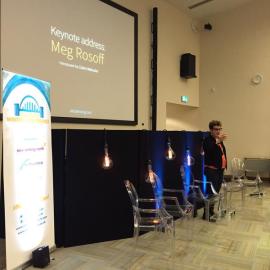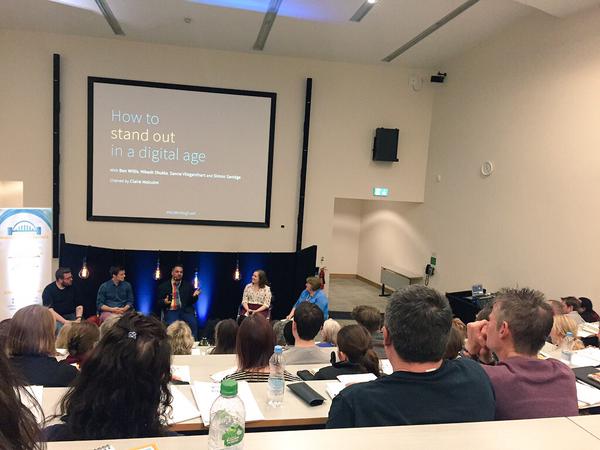
Last weekend I attended the Newcastle Writing Conference at Northumbria University. I went armed with a fresh notebook, which was a good thing because I made more notes than I thought I would, such was the amount of useful advice on offer. I arrived with streaming eyes and a rosy complexion after battling through a hail of dust hurled into my face by the gusts of wind. Not a good start – but it got better. I received my delegate pack and plunged into the crowd to begin anxiously networking. This isn’t my favourite thing, but everyone was friendly and welcoming and I soon relaxed. My notes from the conference are divided into three advice-filled chunks – this is part 1:

We began with a fantastic and funny talk from Meg Rosoff. I’ll never look at pony books the same way again! Her main message was:
“Don’t be in a hurry.”
Writers can begin at any age and keep writing for as long as they like, unlike ballerinas. Meg wrote her first novel when she was 46 – a huge relief and a positive message for us older writers.
Meg’s agent told her to forget about the audience and the rules, and to “write the fiercest book you can.” How I Live Now was the result. She said writing a book is like digging a hole – it’s a lot of drudgery work. But no one is telling you what to do and no one can fire you, except you.
And here’s a great image: think of your brain as a colander – everything you experience goes through it, but occasionally something will stick. Those things are what shape your view of the world and that’s what you use in your writing. Work out what’s in your colander because that’s who you are and where you’ll find your voice. What can you say that no one else can? Think about the quality of what’s in your head: “What’s in your head is your weapon.”
How to Stand Out in a Digital Age
Next up was a panel discussion on social media and blogging with Ben Willis who is head of digital publicity at Transworld, author Nikesh Shukla who wrote a novel about the effects of social media called Meatspace, Simon Savidge who blogs about books at Savidge Reads, and vlogger Sanne Vliegenthart who reviews books at Books and Quills on YouTube. Here’s a taste of the discussion:
Simon Savidge: in relation to blogging you stand out by being yourself and finding your voice.
Ben Willis: be part of a community but don’t try too hard. Don’t force it because it comes across badly. Give it time. It’s not true that you’re more likely to be published if you’re on twitter. You don’t have to do social media if it’s not right for you. Find what you’re comfortable with and then do that well.
Nikesh Shukla: use social media as if you have nothing to promote. Nikesh is active online not because he wants to sell stuff, but because he’s on there anyway. Just post as yourself. Come up with a simple way of getting attention – the fun video he made to promote his novel Meatspace is a good example. But interestingly, the video didn’t increase his book sales. The video went viral but the book didn’t. He found it hard to connect the video to the book for publicity – it wasn’t obvious that the video was selling the book, but if it had been obvious perhaps the video wouldn’t have gone viral.
Sanne Vliegenthart: people like to be part of a community and to talk about what they’re reading.

NS: Authors should engage with reading communities – because you’re a reader too. You should also have a blog because it helps to build a personality around you online so people can see who you are. It’s your brand – although he hates that word!
SS & SV: Podcasts on Goodreads are popular. It’s a good community for readers and writers to connect. But be careful of negative reviews – don’t read them! Authors can also get in touch with bloggers who review books and ask for a review – but you should find reviewers who’ll like what you’re doing. Get in touch with them through social media and you’ll find the right people.
Meg Rosoff (sitting in the audience) mentioned that she had a blog for ages and didn’t think she sold a single book as a result.
SV: Sanne makes lots of sales through her vlog whenever she reviews a book – but she’s selling other people’s books.
(I’ve sold copies of my novel on the back of blog posts that connect with the book, so it can work.)
NS: even though his video for Meatspace didn’t lead to sales, it did lead to him doing other things (like this conference). It helped to make him stand out.
BW: don’t write a blog just for promotion. Do it because you want to write it – in the same way that you write a book because you want to write it. Social media gives you the opportunity to connect with your readers. The authors on twitter who use it well update regularly but not too often, and they don’t necessarily even mention their books. They talk about interesting stuff, so be interesting, funny and current.
Joanne Harris was mentioned as a good example of an author using twitter well.
Question from the audience: how do you balance the time between writing and doing social media?
NS: you play the Golden Game. This means you write at the same time every day without access to the internet. When you write, treat it like the best game of football you’ll ever play and give it your best for 90 minutes.
SV: take twitter breaks.
NS: you can also schedule tweets.
In summary: don’t worry about doing social media if you don’t want to. If you do use it, you’ll get used to it after a while and it’ll get easier. Don’t try to read everything that’s going on, just engage with what’s happening now.
That’s a good piece of Zen-like advice to end on. My notes continue next time with the first break-out session: How to Pitch Your Work
Images: @SavidgeReads; @isophietweet

Very useful info. Many thanks. Hope your having a good weekend. Warmest regards.
LikeLiked by 1 person
Great advice Jessica. Thankyou.
LikeLike
You’re welcome – more to come!
LikeLike